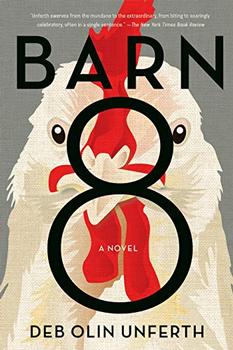Summary | Excerpt | Reviews | Beyond the book | Read-Alikes | Genres & Themes | Author Bio

The Epic Saga of the Bird that Powers Civilization
by Andrew LawlerIt's hard to believe that the mass-produced chickens of today can trace their ancestry to the shy and rarely spotted red jungle fowl of south Asia. It's an impressive arc, one that science journalist Andrew Lawler traces adroitly in his book, Why Did the Chicken Cross the World?: The Epic Saga Of the Bird That Powers Civilization.
While this strong piece of narrative non-fiction does explore the "whys" of the chicken takeover — they could eat a wider variety of food, were amenable to living in small spaces, and produced more eggs over a longer period of the year — it is equally an inquiry into the "hows" of the bird's phenomenal journey. As the subtitle suggests, the chicken touches practically every aspect of society. Before they were ever eaten, chickens were an integral part of religion: "No ancient people, except possibly the Romans, would grant the chicken a greater role and higher status than the Persians and their Zoroastrian religion," Lawler writes. "The cock is created to oppose the demons and sorcerers," states a Zoroastrian tradition. "And when it crows, it keeps misfortune away from creation." Chickens have been an essential part of human culture too. "Babylonian inscriptions...written in the same cuneiform used by the Ur scribes...mention the tarlugallu, translated as the 'royal bird,' which some scholars suspect was the chicken." Move on to more contemporary times: The World Slasher Cup in Manila is the Super Bowl of cockfighting. Then there have been its medicinal uses — right from a cure for bed-wetting to serving as antidote for a snake bite. "For thousands of years, across many cultures, the bird served as a remarkable avian medicine chest. Its meat, bones, organs, feathers, comb, wattles, and eggs all figure frequently in ancient prescriptions," Lawler writes. Chicken eggs, in fact, play a vital role in the crafting of the annual flu vaccine.
An especially intriguing section of Why Did the Chicken Cross the World? traces the chicken's rise as a mass commodity meat. Lawler precisely details how the chicken grew in popularity in the American South and, subsequently, as a source of income for women, before the Tysons and Perdues of the world took over to produce the large-breasted broiler meats of today. For the most part, Lawler sticks to reporting, letting the readers form their own judgments about the ethics of present-day chicken farming. There's not much of the "call to arms" that Jonathan Safran Foer provided in his treatise, Eating Animals. While this is as it should be, passionate animal rights activists might find Lawler's even-keeled reporting mildly frustrating.
It is obvious from his impressive bibliography that Lawler has conducted exhaustive research. And there are plenty of facts that will earn the reader some serious trivia points. For example, did you know that the Plymouth Rock is also a special breed of chicken? However, the book's early chapters, especially those that trace the role of the bird in ancient times, are a little dizzying as Lawler serves us one point after the other before we have had a chance to fully digest what's going on. These straight-up facts are mixed in with on-the-ground reporting which turns out to be more condensed than one would like. Chicken would have been an even better book if Lawler had lingered a little and included more glimpses of the various places he visits: the chicken factory farm, the GlaxoSmithKline pharmaceutical plant in Dresden, Germany that produces flu vaccine from chicken eggs, the cockfight in Manila. As it stands, the book feels like a breathless tour of each and every aspect of the chicken, meant to reinforce the word "epic" in the subtitle. In the end, Chicken might feel a little overstuffed, but it is a well-researched and informative book that will leave readers with plenty to crow about.
![]() This review was originally published in The BookBrowse Review in February 2015, and has been updated for the
April 2016 edition.
Click here to go to this issue.
This review was originally published in The BookBrowse Review in February 2015, and has been updated for the
April 2016 edition.
Click here to go to this issue.

If you liked Why Did the Chicken Cross the World?, try these:

Around the World in Eighty Games
by Marcus du Sautoy
Published 2024
An award-winning mathematician explores the math behind the games we love and why we love to play them.

by Deb Olin Unferth
Published 2020
An unforgettably exuberant and potent novel by a writer at the height of her powers.
Your guide toexceptional books
BookBrowse seeks out and recommends the best in contemporary fiction and nonfiction—books that not only engage and entertain but also deepen our understanding of ourselves and the world around us.